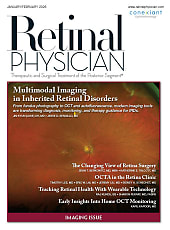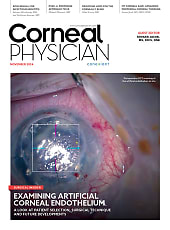I work at an academic medical center and my university is just now starting to acknowledge the toll that burnout has on practicing physicians. As a result, every department was asked to create a wellness officer position and have that officer do a fellowship in physician wellness. I was already the self-appointed “wellness czar” of my department, so I signed up. It is a very depressing course. The data are important and we need to know about problems so we can fix them, but at the same time we have the right to be happy with our career choice. So I decided to write about why retina is, objectively, the best field in medicine.
First, we work on a vital organ and literally save people from vision loss on a regular basis. Sight is so important and we are privileged to help so many people, every single day. How many patients who were legally blind in at least one eye have you returned to driving vision? Probably hundreds just by the end of your fellowship. I would claim that, per patient, a retina specialist is the most important person in all of medicine in terms of restoring the greatest quality of life to the most people.
Second, the retina field embraces new technology instead of being resistant to change. That means working with academic labs and industry to develop new techniques and treatments to make life better for our patients. A vast amount of the clinical research in retina is done in private practice. Industry works with physicians to develop new drug delivery systems, vitrectomy machines, and even update the form factor for syringes and needles for intravitreal injections.
Third, we are paid well. Despite taking massive reimbursement cuts nearly every year, we still make a comfortable living. Our incomes are well above the average for a physician in the United States. For those willing to live outside of major metropolitan areas, that income tends to go up substantially. We are usually able to handle our medical school and college debt while saving for our retirements and children’s educational expenses. In order to reach this point, we performed well for many years in school and through our training. Not all doctors earn what we do, so I consider a retina specialist’s income (even an academic salary) as a positive.
A fourth benefit is work-life balance. My wife thinks I work too hard, but I don’t take primary call and I haven’t rounded in the hospital in years. Yes, I deal with patient phone calls and refills and EMR charting, but all physicians do, and retina physicians have less of these duties than most other physicians. I have hobbies, I take vacations, my kids know who I am, and I know them.
Fifth, we keep in touch. Before the Covid pandemic it was common to see roughly half of American retina specialists attending ophthalmology meetings. Over 700 members of the American Retina Forum communicate every day through social media. Many of my physician friends in other fields rarely interact with their colleagues, but I know what my retina friends’ children are up to and can talk about them as though they are family. Because of the regular communication in the retina field, it is rare for a retina specialist, even in rural practice, to not be aware of the newest treatments for common diseases. That shared knowledge benefits our patients.
So for the newer retinal physicians out there—you picked the right field. Look at the positives and keep working to make things better. NRP









